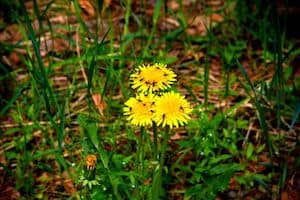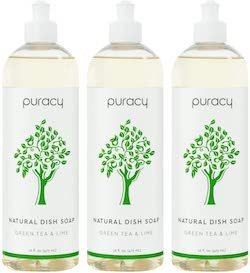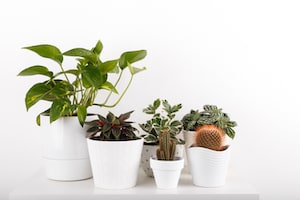Last summer, I was faced with the nuisance of gnats. This caused me to wonder if there was an effective way to eradicate the pest using natural means. So, with a little research the best course of action to eliminate gnats was clear and it actually worked!
So, how do you get rid of gnats naturally? The best natural way to get rid of gnats is by using a soap, sugar, and vinegar trap. By employing the attraction of vinegar and sugar, gnats are lured to the solution only to be trapped by the stickiness of the dish soap.
By eliminating the need for poisons and chemicals, this method of gnat control is safe yet still effective. The entire basis of the technique is trapping rather than killing. Sure, after being trapped in the liquid, the gnats will die, but the mixture does not pose the same threat to humans and animals. If this for some reason does not work for you, don’t worry, as there are plenty of gnat control methods to tackle your pest problem.
How to Take Care of Your Gnat Problem (Quick & Easy)
Sometimes, there are obvious reasons gnats have decided to show up unannounced in your home. Other times, there is not the slightest evidence as to why they would choose your home. This can make getting rid of gnats all the more difficult. Whereas an obvious attraction could be removed, a mysterious attraction cannot be easily identified.
Typically, the average lifecycle of a gnat is around one week. However, in this time period, they can reproduce and expand the population in your home exponentially, so it is important to nip the problem in the bud as soon as you can.

If you are able to deduce that the gnats in your home are living and feeding on a houseplant, there are two ways to easily take care of this. First, you can simply remove the plant from your home temporarily and replace it once the gnats have no longer taken up residence in it. The second option takes slightly more attention but is highly effective.
The gnats are in the plant because of the moisture that both attracts them and provides a hospitable home. To make the environment inhospitable, simply let the plant dry out slightly more than usual, then water once the gnats have died. Plants can survive underwatering and bounce back, but overwatered plants tend to develop root rot as well as fungus and bug problems.
If your gnat problem seems to be centered around a bathroom or sink drain, it is likely time to move beyond natural remedies and use a little diluted bleach to kill both the gnats and whatever they are attracted to. Remember, if your home is attached to a septic field, bleach poured down the drain can kill the essential bacteria and should be avoided.
Though these harsher tactics are sometimes necessary, natural means of pest control and elimination are highly effective and there are plenty of products like lights and traps to aid in the fight against gnats in your home.
How to Get Rid of Gnats Using Vinegar, Soap, and Sugar (Build the Perfect Gnat Trap!)
This quick and easy method for getting rid of gnats has been used in households for ages. Because of its simplicity and safeness, it is a go-to method for many people dealing with the pest. To make the solution, simply mix apple cider vinegar with sugar and dish soap, stir to incorporate, then place it in a safe place near the gnats.
The sumptuous smell of the sugar and apple cider vinegar will quickly attract the gnats and tempt them to land in the liquid. This is where the dish soap takes over. When the stickiness of the dish soap meets the gnat’s weak flying capabilities, it makes for a sticky situation. The gnats will be unable to fly away and will quickly die. Remember, if the goal is to create a “natural” solution, be sure to choose all-natural dish soap.
Apple Cider Vinegar
All Natural Dish Soap

Potential Risk to Other Insects
Though most of us likely do not want any insects in or around our home, this does not mean they are not beneficial to the environment. Using bug zapping lights and sticky traps will likely take care of your gnat population but poses a threat to other more essential flying insects, especially when used outside the home. To ensure your take care of necessary insects like bees and other pollinators, place these traps in areas that are not often in the path of these indispensable insects.
What Are Gnats Anyway?
“Gnats” is actually a generic term for a wider variety of tiny flying insects. This grouping can include fruit flies, fungus gnats, and drain flies, but it not limited to these species. Oftentimes, gnats are very weak fliers that can be easily trapped and eliminated, unless there is a constant hospitable food source.
What Gnats Are Attracted To
Gnats love moisture. Leaking pipes, wet drains, and other moist areas in the home make for the perfect environment to breed gnats. In addition to moisture, gnats are attracted to decomposing organic materials. This could come in the form of over-ripe fruit or food debris in the trash or garbage disposal.
Another common breeding place for gnats is in the moist soil of houseplants. If you notice tiny flying insects around your plants, there are many effective methods and products available to get rid of the gnats and save your plants.
How to Deter Gnats Naturally
To keep your home free of gnats and other insects, there are many practical ways that do not require much work, time, or money. The most obvious way to deter gnats and other insects is by maintaining a clean environment. Clearing and wiping down your kitchen countertops can remove food residue that would otherwise attract gnats.
Like countertops, sinks should be cleaned and periodically deep cleaned. Food residue build-up will often result in a growing gnat population. Special attention should be given to sink drains, as gnats are attracted to the consistent moistness of these areas as well as the smells that linger from the drain. Though bleach is highly effective for cleaning sinks and drains, there are all-natural products on the market that are designed to kill gnats and flies.
Getting rid of or deterring gnats and flies can be as simple as taking the garbage out regularly. Your garbage bag may not be full, but if food or other organic material has been tossed, it may be wise to remove it from your home. Many of these gnat and insect deterring tips will lead to a cleaner, better-smelling home.
Gnats Are Attracted to You
Beyond your home, you have likely noticed that gnats are attracted to you, often annoyingly flying around your face. This could be because you have makeup or lotions that attract the pests or this could come as a result of their attraction to carbon dioxide, which you are regularly exerting from your face.
Whatever the reason, this can prove to be extremely irritating. If staying away from gnat-attracting products on the face does not seem to do the trick, you can try holding a hand above your head when they get bad, as gnats are prone to going to the highest point of your body.
Do gnats bite?
Not all gnats are the same, but some species of gnats do bite because they, like many flies and other insects. These are parasitic gnats that feed off of blood. Because of this tendency, it is important to rid your home of the pest in order to stop the spread of disease to you, your family, or your pets.
How do gnats get in your house?
Most gnats are able to fly through an open door or open window. They are smaller than most flies and can squeeze through a very tiny opening. Sometimes, gnats can enter your home through the HVAC system. If you determine this to be the case, it is important to contact a HVAC professional to address the issue.
Are gnats dangerous?
Most gnats do not pose a threat to you or your home beyond being a nuisance. Some gnats can spread diseases and should be taken care of. If you notice strange bites or catch a gnat in the act, it is important to take appropriate measures to eliminate the gnat population in your home.
Are gnats active in the winter?
The cold outside air in the winter makes for a fairly inhospitable environment for gnats. However, this does not mean the pests will not seek shelter in your home during the winter. The good news is that many homes’ heating systems make for a drier inside environment throughout the duration of winter, deterring gnats from seeking them out.



